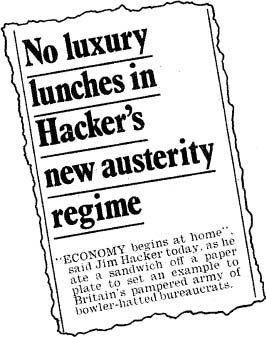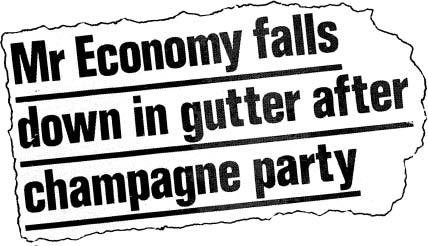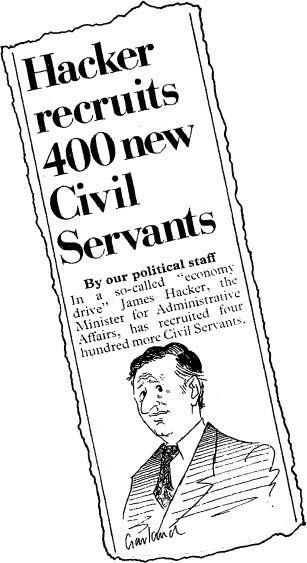The Complete Yes Minister (11 page)

Annie couldn’t seem to understand. ‘You’re bloody mad!’ she exploded. ‘For twenty years as a backbencher you have complained that you had no facilities and no help. Now you’ve been given them, and you’re throwing them away.’
I tried to explain it, but she wouldn’t let me get a word in edgeways. ‘For twenty years you’ve wanted to be a success – why did you want it if it brings no greater comfort than failure?’
I explained that this move would give me much greater power in the end.
Annie was unimpressed. ‘And how will you travel when you’re Prime Minister? Hitch-hike?’
Why can’t she understand?
December 21st
Great progress today with the economy drive.
The office work is getting a bit behind, with twelve fewer people in my Private Office. Bernard is working overtime, and so am I, but clearly we didn’t need all those people out there, reading my letters and writing my letters, and making appointments and answering phones, and drafting replies to questions and – basically – protecting me from the outside world. I don’t need all those people to shield me. I am the people’s representative, I should be available to one and all, shouldn’t I?
However, we have to avoid screw-ups like this morning, when I arrived an hour and a half late to open a conference. What made it even more unfortunate was that it was the Business Efficiency Conference!
And, because we’ve abolished the night shift for cleaners (a really useful economy, in my view), I had a cleaning lady in my office vacuuming. Bernard and I had to shout at the tops of our voices as we discussed the week’s diary. But I’m sure these little wrinkles can be ironed out.
Tomorrow I have a vital meeting with Mr Brough, Director of Manpower Planning for the North-East Region, on the subject of staff reductions. I’ve never met him, but Bernard tells me he’s eager to make cuts.
The biggest progress is in the media coverage I’m getting. A front-page story in the
Express
. Couldn’t be better.
Express
. Couldn’t be better.

SIR BERNARD WOOLLEY RECALLS:
2
2
I remember Jim Hacker’s first economy drive only too well. I suspected, green though I still was, that Sir Humphrey Appleby had created a potentially disastrous situation.
It was impossible for me to run the Private Office single-handed, with just a couple of typists to help. Errors were bound to occur, and sooner or later there would be a calamity.
The calamity occurred sooner than even I expected. On 21 December, the day after Hacker had received some favourable publicity, Ron Watson arrived at the Department without an appointment. Watson was the General Secretary of the Civil Service Transport and Associated Government Workers.
He demanded to see the Minister at once, because of what he described as ‘disturbing’ rumours about cut-backs and redundancies affecting his members. The rumours were clearly generated by the numerous press stories of which Jim Hacker was so ludicrously proud.
I told Watson that nobody could see the Minister without an appointment, and left the Private Office to go to the Whips’ Office. I was even having to run errands myself, as we were so short-staffed. Had we been fully staffed, Watson would never even have got as far as Hacker’s Private Office without an appointment. I left a typist to arrange an appointment for Watson to see Hacker.
Apparently, after I left the room, Brough of Manpower Planning telephoned to say he had missed his train from Newcastle, and could not keep his appointment. Watson overheard, realised that Hacker was free at that moment, and walked straight into his office.
And because there were no other Private Secretaries, due to the economy drive, no one stopped him. And no one warned the Minister that he was meeting Watson instead of Brough.
No greater mishap could have occurred.
December 22nd
Today, everything collapsed in ruins. Total disaster.
I was expecting Mr Brough of Manpower Planning (NE Region) at 3 p.m. A man walked into my office and naturally I assumed he was Brough.
‘Mr Brough?’ I said.
‘No,’ he said, ‘my name’s Ron Watson. Mr Brough has had to cancel the meeting.’
Naturally, I assumed that Watson had been sent by Brough, and had come instead. So I interrupted, thanked him for coming and asked him to sit down and said, ‘Look, Mr Watson, before we start there’s one point I have to emphasise. This simply must not get out. If the unions were to hear of this all hell would break loose.’
‘I see,’ he said.
‘Of
course
there are going to be redundancies,’ I continued. ‘You can’t slim down a giant bureaucracy without getting rid of people. Ultimately, lots of people.’
course
there are going to be redundancies,’ I continued. ‘You can’t slim down a giant bureaucracy without getting rid of people. Ultimately, lots of people.’
He asked me if I wouldn’t be holding discussions with the unions first.
I continued to dig my own grave. ‘We’ll go through the usual charade of consultation first,’ I said, blithely unaware of the impending catastrophe, ‘but you know what trades unionists are like. Just bloody-minded, and as thick as two short planks.’ How could I have spoken like this to a total stranger?
‘All of them?’ he asked politely.
I was surprised by this question. I thought he should know, after all, he had to negotiate with them. ‘Pretty well,’ I said. ‘All they’re interested in is poaching members from each other or getting themselves on the telly – and they can never keep their big mouths shut.’
I remember quite clearly every word that I spoke. Each one is branded on my heart. Furthermore, it’s all written down in front of me – in an interview that Watson gave to the
Standard
as soon as he left my office.
Standard
as soon as he left my office.
Then the man asked me about drivers and transport service staff, specifically. ‘They’ll be the first to go,’ I said. ‘We’re wasting a fortune on cars and drivers. And they’re all on the fiddle anyway.’
It was at this moment that Watson revealed that he was not Mr Brough’s deputy, but was in fact the General Secretary of the Civil Service Transport and Associated Government Workers. And he had come to my office to check that there was no truth in the rumours about redundancies for his members!
Oh my God! . . .
December 24th
Yesterday and today there has been an acute shortage of Christmas cheer.
All the Civil Service drivers are on strike. I arrived yesterday morning, having read all about the strike in the press. All the papers quoted Ron Watson quoting me: ‘Of course there’s going to be redundancies. Lots.’
I asked Bernard how he could have let this happen.
‘CBE, Minister,’ he replied, unhappily.
I wasn’t sure what he meant. Could I have been awarded the CBE? – or could
he
?
he
?
He explained. ‘Can’t Be Everywhere’. Another idiotic Civil Service abbreviation. ‘In normal circumstances . . .’ he petered out. After all, we both knew how this tragedy had occurred.
Bernard reminded me of all my appointments for today. An office Christmas party, some meetings – nothing of any consequence. I spent the day dodging the press. I wanted to discuss the situation with Sir Humphrey, but apparently he was unavailable all day.
Annie and I were invited to the French Embassy’s Christmas party, at 8 p.m. I asked Bernard to get me my car – and then realised, as I spoke, that there were no drivers. I told him to call Annie, to get her to bring our car in to collect me.
Bernard had already thought of that, but apparently our car had been giving trouble all day and Annie wanted to take it to the garage. I got hold of her and told her the garage would wait – the car would get us from Whitehall to Kensington okay.
Annie came for me, we set off in our evening clothes.
Yet again I was wrong and the bloody car broke down in Knightsbridge. In the rush hour. In the pouring rain. I tried to fix it. I was wearing my dinner jacket. I asked Annie for the umbrella, she said I had it. I knew she had it. We shouted at each other, she got out and slammed her door and walked away, and I was left with the car blocking all of Harrods’ Christmas rush hour traffic with horns blaring and drivers yelling abuse at me.
I got to the French Embassy an hour and a half late, soaked to the skin and covered in oil. I had three or four glasses of champagne right away – well, who wouldn’t in the circumstances? I needed them!
When I left, not drunk exactly, but a bit the worse for wear, I must admit, I dropped my keys in the gutter beside the car. Then they fell down a grating, so I had to lie down to try and reach them, and some bastard from the press was there.
This morning I had a frightful hangover. I felt tired and sick. The press had really gone to town over my alleged drunkenness. They really are unbelievably irresponsible nowadays.

Another paper’s headline was HACKER TIRED AND EMOTIONAL AFTER EMBASSY RECEPTION.
Sir Humphrey read it aloud, and remarked that it was slightly better, perhaps, than the first.
‘Better?’ I asked.
‘Well . . . different, anyway,’ said Sir Humphrey.
I asked if anyone had said anything beyond ‘tired and emotional’. Bernard informed me that William Hickey said I was ‘overwrought’. I didn’t mind that quite so much, until Sir Humphrey added – for clarification – ‘overwrought as a newt, actually’.
By now I felt that it could not get any worse. But I was wrong. Bernard produced today’s lead story from the
Daily Telegraph
, which, astonishingly and horrifyingly, claimed that
I
was recruiting extra staff to the DAA.
Daily Telegraph
, which, astonishingly and horrifyingly, claimed that
I
was recruiting extra staff to the DAA.

I demanded an explanation from Sir Humphrey. And he had one ready, of course.
‘Minister, you
asked
for these extra people. You demanded a complete study, a survey, facts and figures. These measures cannot be taken by non-people. If you create more work, more people have to be employed to do it. It’s common sense.’
asked
for these extra people. You demanded a complete study, a survey, facts and figures. These measures cannot be taken by non-people. If you create more work, more people have to be employed to do it. It’s common sense.’
While I was taking this on the chin, he came in with another right hook to the head. ‘And if you persist with your Bureaucratic Watchdog Office, there’ll be at least another four hundred new jobs there as well.’
I was shattered. My head was aching, I felt sick, my career seemed to be in ruins, I was being pilloried in the press and the only idea of mine that I’ve managed to push through since I’ve been here had now to be abandoned.
Yet, throughout, from my first day here, all the permanent officials appear to have been doing their best to help me in every possible way. So are they completely inept? Or am I? Are they pretending to help while secretly obstructing my every move? Or are they incapable of understanding a new approach to the Department’s work? Do they try to help me by pushing me towards the Ministry’s policy? Is there a difference between the Minister’s policy and the Ministry’s policy? Why am I asking so many questions to which there is no known answer? How deep is the ocean, how high is the sky? [
Irving Berlin – Ed
.]
Irving Berlin – Ed
.]
There was silence in the office. I didn’t know what we were going to do about the four hundred new people supervising our economy drive or the four hundred new people for the Bureaucratic Watchdog Office, or anything! I simply sat and waited and hoped that my head would stop thumping and that some idea would be suggested by someone sometime soon.
Other books
Deadly in New York by Randy Wayne White
Making Records: The Scenes Behind the Music by Ramone, Phil
Starclimber by Kenneth Oppel
The Cosmopolitans by Nadia Kalman
Paradigm (9781909490406) by Lowe, Ceri A.
The Namedropper by Brian Freemantle
Colors of Me by Brynne Barnes
The Hallowed Ones by Bickle, Laura
Dancing in the Darkness by Frankie Poullain
Parties in Congress by Colette Moody
